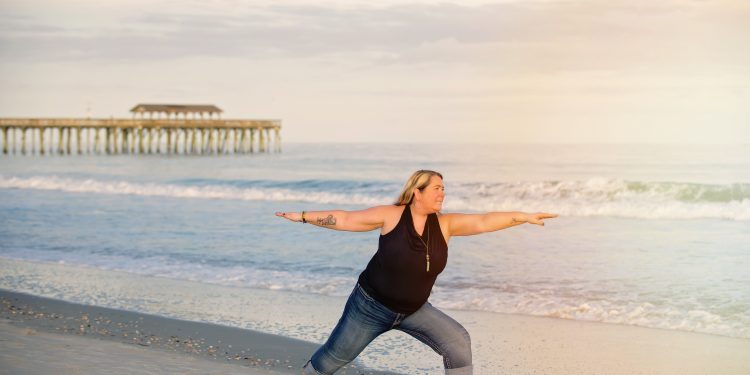by Amy Zellmer, Editor-in-chief
Yoga is a powerful tool for recovery after brain injury. Contrary to some beliefs, everyone can do yoga — you don’t need to be super flexible, have great balance, or even be able to stand up. The beauty of yoga is that every pose can be modified so that anyone can be accommodated.
An important aspect of yoga is the breath. Connecting the breath to your body and flow, and getting oxygen flowing to your brain, is what makes it so powerful for recovery. Yoga is also a time to quiet the mind, letting anxiety and distracting thoughts drift away.
Warrior II pose (Virabhadrasana) is a strengthening pose that improves physical and mental endurance. “Virabhadrasana is believed to be the stance (shape and pose) Vrabhadra took as he drew his sword to remove the head of his enemy. Stretching your upper legs and ankles while expanding your chest and shoulders makes the Warrior II pose an essential foundation for most asana-based (pose-based) yoga practices.
Some of its many benefits include acquiring balance and steadiness, stretching groin, thighs, and ankles; expanding the chest, lung, and shoulders; strengthening the shoulders and arms; increasing mental focus and concentration, and building mental stamina and endurance.
Instructions:
- Step your right foot to the top of your mat, and your left foot about three feet behind you. Point your right toes straight forward, and your left foot about parallel to the back of your mat. Drawn an imaginary line from your right toes to your right heel to your left arch.
- Bend your right knee so it is over your right ankle. Press equally into both feet.
- Square your shoulders to the left side of your mat and extend your arms out wide, parallel to the ground, palms facing down.
- Keep your torso upright, shoulders over your hips.
- Keep your gaze straight ahead, or turn to the fingertips of your right hand. Hold for 60 seconds. Inhale to straighten your front leg and release the pose. Repeat on the other side.
Adjustments and modifications:
- You can shorten the length of your stand, or bend your back knee to relieve pressure in the knees.
- For added support, you can place a chair under your forward thigh.
- Press your back heel into a wall for balance and support.
- Rather than turning your head, you may look straight ahead and maintain length in your neck.
- Place your palms face up to help soften the shoulders.
If you are interested in learning more about yoga, check out www.loveyourbrain.com and their yoga programs throughout the U.S. at partner studios, which are completely free to brain injury survivors and caregivers.











